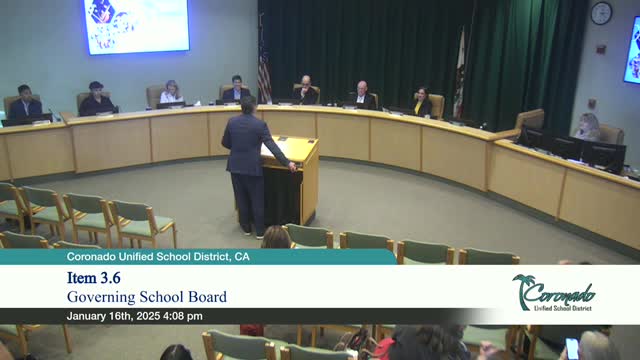Superintendent says district entering ‘community-funded’ era, urges strategic budgeting
Get AI-powered insights, summaries, and transcripts
Subscribe
Summary
Superintendent Mueller told the Coronado Unified School District board the district is transitioning to community-funded/basic aid, outlined enrollment and program strengths, and urged the board to adopt new financial priorities as revenues shift in 2027.
Superintendent Mueller told the Coronado Unified School District Board of Trustees the district is entering a new “community-funded” or basic aid funding model and urged trustees to prioritize programs and reserves as the revenue timetable changes.
Mueller opened his annual state of the district by placing the district’s financial and academic picture in context: about 2,700 students (he later referenced 2,740), roughly 40% military-connected, a 98% graduation rate and a portfolio of pathway programs including STEM, world language and visual and performing arts. He said the district’s enrollment has declined from a pre-2020 average near 3,100 to the mid-2,700s and that inter-district transfers historically range from 12% to 19%.
The superintendent said the district’s budget “bridge” strategy has been deliberately building toward basic aid and that this year’s budget cycle includes the first year of community-funded revenue. He estimated an anticipated increase in revenue in the range of "$8 to $10,000,000" and said the governing board must preserve at least the mandatory 3% reserve while budgeting for the different cash flow model that basic aid brings. “We can do anything, but we can’t do everything,” he said, attributing the phrase to a motto used in department discussions.
Why it matters: the change to community-funded/basic aid alters timing and certainty of revenue and therefore affects staffing, facilities and program decisions. Mueller urged the board to update Board Policy 3050 and create a new “North Star” financial document to guide spending decisions during the transition and beyond.
Supporting details and programs: Mueller described investments that have supported pathways and student opportunities, including DoDEA grants, Coronado Schools Foundation partnerships, dual-credit agreements with Southwestern Community College, and internships (the Coronado Historical Association’s internship and third-grade curriculum were presented earlier in the meeting). He highlighted curriculum and pathway expansions at Coronado High School (an aerospace engineering course and capstone for engineering, robotics and sports medicine) and said some course expansions were enabled by strategic use of reserves and external grants.
Safety, planning and instructional audits: Mueller summarized other district initiatives that feed into strategic decisions — an independent audit of emergency preparedness and school safety operations, an instructional audit conducted in collaboration with San Diego State University educators, and a recently completed Portrait of a Graduate process the district intends to implement through a strategic planning team.
Budget mechanics and cautions: Mueller described how basic aid changes cash flow (payments arrive differently than under LCFF) and explained the district will need more than the 3% minimum reserve to cover two to six months of operating cash under the new model. He said the board will face competing priorities — from facilities upgrades to technology and staff compensation — and must make deliberate, prioritized choices. Deputy Superintendent Salamanca and board members asked follow-up questions about how developer fees and other funding streams interact with basic aid.
Next steps and timeline: Mueller said the board would need to update Board Policy 3050 and produce a guiding financial document; he also noted the district will continue to present more detailed budget and reserve analysis in upcoming meetings.
Ending: Mueller concluded the presentation by saying the “state of the district is sound,” attributing that to staff, teachers and community support, and thanking the board and community for their commitment to sustaining programs while the district moves into the basic aid model.
